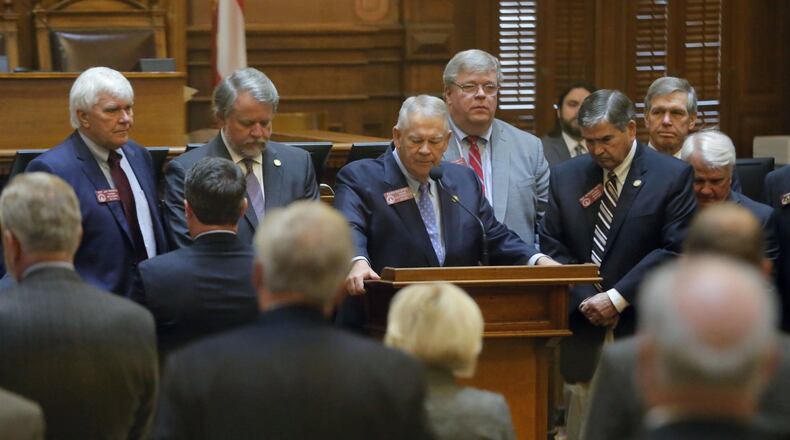Gov. Nathan Deal proposed $200 million worth of income tax credits Tuesday for landowners in southwest Georgia as incentive for them to replant trees destroyed last month by Hurricane Michael.
The tax break was part of Deal’s package introduced as state lawmakers convened a special session designed to help fund the cleanup and rebuilding of southwest Georgia after the storm.
“We have some important work to do today and this week,” House Speaker David Ralston, R-Blue Ridge, told his chamber as it opened for business.
The tax break would aid both timber and pecan farmers who saw their trees destroyed by the storm.
State officials said losses from the storm in the agriculture industry alone could reach nearly $3 billion.
Timber losses are estimated at $1 billion, as about 1 million acres were destroyed, state figures show. Cotton, peanuts, pecans, vegetables and poultry also were hit hard.
The tax credits would be available to landowners in 28 counties hardest hit by the storm. Deal’s chief of staff, Chris Riley, called the $200 million “a drop in the bucket to what was lost.”
Chuck Williams, the director of the Georgia Forestry Commission, said many southwest Georgia timber farmers saw 40 to 50 years’ worth of investment wiped out in a few hours.
“A lot of our landowners there are still in shock,” Williams said. “It is really hard for us to get a reading on what the demand (for tax credits) would be.”
Riley said if enough seedlings were available, it would take six years to replant the trees lost in the hurricane.
Deal also proposed about $270 million in other spending, much of it going to debris cleanup. The state will pay part of local government costs, including overtime for staffers who worked long hours during and after the storm.
The state is essentially fronting the cost of trying to get areas hit by Hurricane Michael back to some semblance of normal because the federal government is expected to eventually pick up the tab. However, Riley said it could take months if not years for the federal government to fully reimburse the state and local governments.
The plan includes $30 million in emergency disaster relief for farmers, $20 million for timberland cleanup, $25 million for local communities where infrastructure was affected by the storm and $7.4 million to replace firefighting equipment used to clear destroyed timberland.
The package also includes some nonstorm-related spending, such as $35 million for a new technical college aviation academy in Paulding County and $9.3 million for the private Mercer School of Medicine to establish a campus in Columbus. Such items are typically included in the midyear budget governors propose in January. Deal, who leaves office in January, is a Mercer University graduate.
During what is expected to be a five-working-day legislative session, lawmakers will also consider whether to continue a tax break for companies that use jet fuel.
Deal signed an executive order in July suspending collection of the state sales tax on jet fuel. The tax break, and an earlier decision not to collect local jet-fuel taxes, could save Delta Air Lines about $40 million a year. Deal's executive order must now be considered by lawmakers.
Some lawmakers have objected to continuing the tax break — which the General Assembly declined to approve during the 2018 regular session. So the administration sent word late last week that the suspension would only run through June 30 — the end of the fiscal year.
Lawmakers could have approved the money for storm cleanup without a special session, which costs more than $40,000 a day. The General Assembly has a committee of leaders who can approve moving money in the budget during such emergencies.
However, without the session, the General Assembly wouldn’t have considered the tax legislation Deal is proposing until January, when the newly elected Legislature convenes.
Stay on top of what’s happening in Georgia government and politics at ajc.com/politics.
About the Author
Keep Reading
The Latest
Featured



